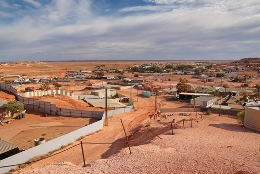14 September 2016
 The turnover of food and beverage products from community stores in remote Indigenous communities (RICs) is an excellent indicator of dietary intake estimates of populations in remote communities.
The turnover of food and beverage products from community stores in remote Indigenous communities (RICs) is an excellent indicator of dietary intake estimates of populations in remote communities.
Research undertaken by UniSA health experts Dr Tom Wycherley and Professor Kerin O’Dea indicates that 98% of food and beverages consumed in RICs is measured by turnover from community stores relative to other sources such as take-away and Aged Care services.
Professor O’Dea says that community stores are recognised as the primary vendors of food and beverage turnover in RICs, but whether that turnover was sufficient to estimate community-level dietary intake, had not been previously established.
“The results indicate that combined stores contributed 98.1% of total food and beverage turnover quantity and 98.6% of expenditure, with dietary intake estimates for energy and macronutrients almost entirely provided by store-derived food and beverages,” Professor O’Dea says.
“It is possible therefore to look at the turnover of a community store to get an estimate of the dietary intake of those living in remote communities.
“Unlike in a city, where there is a multiple choice of food and beverage outlets and where healthy food and drink products are usually cheaper – due to cost of transportation and demand - in remote communities there is less choice and higher costs associated with products on offer.
“As a driver therefore, the community store - through the products that it provides and the price they are being sold for – influences the dietary intake, and subsequent health of those living in remote communities.
“Non-store providers still play an important role in ensuring the proportionally small sub-set of vulnerable individuals within the community receive quality food (e.g. Aged Care program meals for the elderly, and provision of breakfast for school students).”
The study results provide evidence to greatly improve the efficiency of acquiring dietary intake estimates for RICs, that can be used by researchers, policy makers and community stakeholders.
Further information
Contact Kerin O’Dea 8 830 21446 email Kerin.O'Dea@unisa.edu.au
Media contact: Will Venn mobile: 0401 366054 email: will.venn@unisa.edu.au




